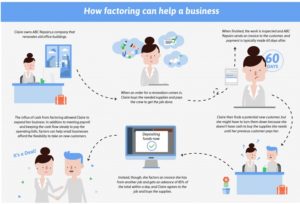

As mentioned above, businesses can sell their receivables to factors for an easy way to receive cash. Similarly, the cost of factoring is also higher for businesses as compared to running a dedicated internal credit control department that runs efficiently.Īnother disadvantage of factoring for businesses is that it comes with a negative reputation. This is mainly because a business selling its receivables will get lower compensation from the factor as compared to the value of the receivables it is selling. One of the main disadvantages of factoring is that it is costly. Disadvantages of Factoring Accounts Receivable

For fast-growing business, in particular, factoring may be a better option than a credit control department that cannot keep up with volume growth. Similarly, as discussed above, these businesses may also want to focus on other tasks that can give them a competitive edge and let the factor deal with their receivables. This is because these businesses may not have a competent credit control department to look over their receivables. Management can focus on more important value-adding tasks rather than focus on the recoverability of receivable balances.įinally, factoring can be very advantageous for small businesses and fast-growing businesses. Similarly, the business can also save management time. By outsourcing its credit control to a factor, the business can easily save up on administration costs. Secondly, while it does come with some costs, factoring can also help a business save costs. This can be a life-saver for businesses that are going through cash flow problems. For example, if a business is in dire need of cash flows and does not expect any payments from receivables soon, it can easily sell its receivables and receive cash for it. Therefore, it can provide some quick cash flows to a business. The main advantage of factoring is that it can help businesses looking for cash or going through cash flow problems. Advantages of Factoring Accounts Receivable There are certain advantages and disadvantages of factoring that businesses must face. Furthermore, these businesses can offer financing services and credit insurance services. It includes two main types, Recourse factoring and Non-recourse factoring. The first type of service that factoring businesses offer is debt collection and administration services. There are three types of services that factors offer to businesses. In factoring, the debts which a business sells to a factor, usually at a lower price than the receivables are worth. Factoring receivables consists of outsourcing the credit-control of a business to a third-party specialist. To do this, they can factor their receivables. Notes Receivable - Financial Accounting What is Factoring?īusinesses may try to speed up the recovery process of receivables To tackle problems associated with receivables. Bad debts are defaults on payments from customers. Furthermore, another problem that comes with higher receivables is that of bad debts. The main reason for this is that while receivables do result in future cash flows to the business, they still take some time. First of all, when businesses allow their customers with better credit sales terms, it may create cash flow problems for the business. While making credit sales can be highly beneficial for businesses as it allows them to increase their sales significantly, it may also come with some problems. Other factors may include working capital policies, financing costs and costs of credit control. Similarly, it may also depend on the demand for the products of the business. For example, it may depend on the credit terms of the industry or competitors of the business. Different factors influence these policies. Usually, businesses will have credit policies that will influence their account receivable balances. The accounts receivable balance of business represents all its credit sales to customers for which it hasn’t received cash.


 0 kommentar(er)
0 kommentar(er)
